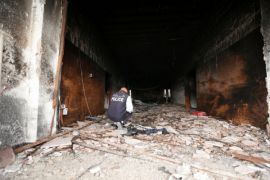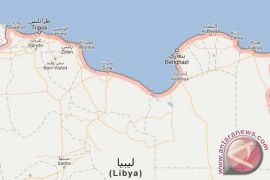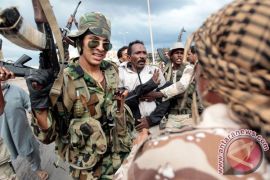"The colonialist countries are hatching a plot to humiliate the Libyan people, reduce them to slavery and control the oil," he said on state television.
Kadhafi addressed his remarks to the people of Zintan, 120 kilometres (75 miles) southwest of Tripoli, which is in rebel hands but surrounded by his own troops.
He again said Al-Qaeda was behind the insurrection that began on February 15 and called on the inhabitants of Benghazi, the rebels` main base, to "liberate" the eastern city.
Kadhafi made similar accusations against Western countries, especially France, in interviews aired by the French LCI television channel and Turkish television Wednesday.
"If Al-Qaeda manages to seize Libya, then the entire region, up to Israel, will be at the prey of chaos," he told Turkey`s public TRT channel.
The sounds of shellfire and four large explosions were heard early Wednesday from west of the rebel-held oil town of Ras Lanuf, where the lightly-armed insurgents have been checked in their attempt to occupy Bin Jawad, some 30 kilometres (19 miles) away.
Aircraft were flying overhead but had not launched any strikes.
The rebels said their own forces were 20 kilometres west of Ras Lanuf, while the government troops had not moved from Bin Jawad, where a rebel spokesman said Tuesday they had dug themselves in.
From Zawiyah, just west of Tripoli, a former official, Murad Hemayma, said Kadhafi wanted to take control of the city by Wednesday after days of siege which has seen many civilian casualties.
"Round every corner there are people shooting," he said. "The international community must do something."
As pressure grew from inside Libya and elsewhere in the Arab world for a no-fly zone, the White House said US President Barack Obama and British Prime Minister David Cameron had agreed to press forward with planning, including at NATO, on a range of possible responses.
Measures under consideration included surveillance, humanitarian assistance, enforcement of the arms embargo and a no-fly zone, the White House said.
Cameron said the world could not stand aside while Kadhafi did "terrible things" to the Libyan people. "We have got to prepare for what we might have to do if he goes on brutalising his own people," he added.
Britain and France have made the most aggressive calls among Western powers for a no-fly zone to stop Kadhafi`s troops attacking opposition forces, and a senior UN official in New York said the Security Council had discussed the matter.
Washington has been markedly less enthusiastic about the possibility of enforcing a no-fly zone than some of its allies, with officials noting that it would likely require taking on Libya`s air defences.
"I think it`s very important that it`s not a US-led effort because this comes from the people of Libya themselves," US Secretary of State Hillary Clinton told Sky News. "We think it is important that the United Nations make that decision."
In Cairo, US ambassador to Libya Gene Cretz and other US officials met members of the opposition seeking to topple Kadhafi, the State Department said, declining to identify them.
"We are engaging a wide range of leaders, and those who both understand and can potentially influence events in Libya," State Department spokesman Philip Crowley said.
Crowley said Washington had been in contact with opposition members inside and outside the provisional national council declared by the rebels.
Top European lawmakers called Wednesday on EU leaders to recognise formally Libya`s opposition and support the imposition of a no-fly zone, after members of the national council came to the Strasbourg parliament seeking legitimacy.
On the oil markets prices fell back again Wednesday as producer countries showed signs of increasing output to counter the effects of turmoil in the Middle East and North Africa, analysts said.
New York`s main contract, light sweet crude for delivery in April, shed 67 cents to $104.35 per barrel in Asian trading while Brent North Sea crude fell 76 cents to $112.30.
Saudi Arabia, the world`s largest oil supplier, pledged to meet any needs, but analysts still warned that crude prices could reach record highs above $200 a barrel.
Foreigners fleeing the violence are still crossing from Libya into Tunisia, though UN High Commissioner for Refugees Antonio Gutteres said Tuesday they had been cut to fewer than 2,000 people a day because of effective supervision by the Libyan authorities.
Guterres visited the Tunisian side of the border with William Swing, director general of the International Organisation for Migration (IOM), spending an hour at a packed transit camp.
He paid homage to the "extreme generosity of the Tunisian people" and interim government set up following the January ouster of president Zine El Abidine Ben Ali.
"The Tunisians who are themselves living a period of transition, who have serious economic problems, have opened their frontier, their hearts, their houses and taken in more than 110,000 people, guaranteeing them protection and help," he said.
Elsewhere in the volatile region, a Yemeni died of gunshot wounds Wednesday after being hit when police opened fire overnight on anti-regime demonstrators in Sanaa, a medical official said.
The protester was wounded with three others when police fired live bullets and tear gas to disperse the students` demonstration outside Sanaa University late Tuesday.(*)
(Uu.B002)
Editor: Ruslan Burhani
Copyright © ANTARA 2011



